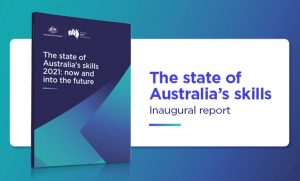The path forward for Australia’s economy centres around a workforce skilled in care, computing, cognitive abilities and communication, or the “four Cs”.
National Skills Commissioner, Adam Boyton, today launched the State of Australia’s Skills 2021: now and into the future report, which outlines the current, emerging and future skills needs of Australia.
“Our research and analysis confirm that the shape of Australia’s workforce is changing as we deal with big forces like the ongoing shift to services, advances in technology, growing automation and the need for post-school education and training,” Mr Boyton said.
More than 90% of new jobs that will emerge in the next five years will require post-school qualifications.”
The NSC’s report finds that some of the most important and rapidly growing skills needs over the coming years are:
- care – the group of skills responding to demographic change, such as the ageing of the population
- computing – a group of skills needed to respond to the digital world and the increasing use of digital technologies across the entire economy
- cognitive abilities – the group of advanced reasoning and higher order skills computers cannot easily replace, especially non-routine cognitive skills
- communication – the group of skills needed to collaborate and engage within and across workplaces.
The report also identifies which skills are emerging and trending in Australia.
“Data and digital skills are the fastest growing emerging skills employers are seeking. What we also need to recognise is that these skills are also increasingly required in a broad range of jobs across the economy,” ,” Mr Boyton said.
“It is clear we will need a highly skilled workforce to support our economic growth into the future. The challenge is to shape Australia’s workforce to meet employers needs now, secure opportunities for Australian businesses to grow local jobs in the future and compete as a key player in the global economy.
To view the report in full visit http://www.nationalskillscommission.gov.au/SOAS.
Morrison Government securing Australia’s workforce
Following the first State of the Skills Report delivered by the National Skills Commission, Minister for Employment, Workforce, Skills, Small and Family Business, Stuart Robert, also announced new measures to equip Australia’s workforce with the skills needed to grow Australia’s prosperity now and into the future.
He said the Morrison Government will deliver a range of measures designed to build workforce capability, support job mobility and ensure challenges such as workforce shortages, the accelerated pace of change with increased use of digital technology, and more flexible ways of working were addressed.
A range of measures will also be introduced to help Australians connect to meaningful employment and inform and empower industry to play the important role of attracting and retaining employees, including:
- $8 million to increase the number of Job Fairs in regional and metropolitan areas and connect more Australians with local jobs.
- Expand the successful Launch into Work program to $74.7 million worth of projects to be funded each year to prepare job seekers for vacancies through work experience, training, and mentoring.
- Expand the 1800 CAREER service to Australians aged 25 and older who are self-managing their search for work using the Government’s online employment services.
- Work to fast-track entry into the workforce through the apprenticeship and traineeship sector by investing $10.5 million over the next three years to work intensively with the New South Wales and South Australian governments to pilot novel approaches to accelerate qualification completion time.
- $49 million will be delivered to double the number of places in The Skills Checkpoint for Older Workers Program and increase the number of Skills and Training Incentives available, to assist older Australians to adopt a lifelong approach to learning, upskilling and reskilling, all while reducing their reliance on income support.
- $10 million will be invested to develop an integrated data tool which would deliver a comprehensive, near real-time, regional view of Australia’s workforce, skill, and labour market.
‘We will also look to those who have migrated to Australia, and how we can support them to take up work in areas of demand which our domestic workforce is unable to fill,” he said.
“We will spend nearly $20 million through to 2023-24 to deliver faster, cheaper skills assessments which will acknowledge the valuable skills migrants have brought with them and their ability to contribute to the Australian workforce. Our targeted migration settings will continue to be considered holistically, informed by Australia’s broader domestic workforce objectives to ensure they complement each other.
“Our vision for skills reform and a funding model that provides national consistency for students, underpinned by improvements to the collection, timeliness and transparency of data across the Vocational Education Training (VET) system, will ensure we’re training Australians with the right skills to get the jobs in demand.”



